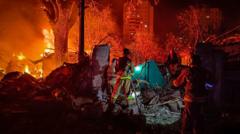The decision has raised questions about diplomatic relations between Italy, the U.S., and Iran.
Italy Sets Free Iranian Man Sought by U.S. in Drone Attack Case

Italy Sets Free Iranian Man Sought by U.S. in Drone Attack Case
Italian Justice Ministry's unexpected decision follows the release of an Italian journalist in Iran.
In a surprising move, Italy's Justice Ministry announced on Sunday that it has requested the revocation of the arrest for Mohammad Abedini Najafabadi, an Iranian man sought by the United States for allegedly assisting in a drone attack that killed three American soldiers. The request, made just days after Iran released an Italian journalist, Cecilia Sala, has drawn significant attention to the evolving diplomatic dynamics.
Najafabadi, 38, was apprehended in Milan in December and faced extradition requests from the U.S. Justice Department for allegedly providing materials used by an Iranian-backed militia for an attack on a military base in Jordan. However, the Italian Justice Ministry stated it lacked sufficient grounds for his extradition. Following the Ministry’s announcement, Iranian state media quickly reported his release, although the Italian government did not immediately confirm this development.
The timing of this decision has led to speculation about a potential connection between Najafabadi's case and that of Cecilia Sala, who was detained shortly after Najafabadi. Prime Minister Giorgia Meloni indicated that Sala's release was linked to diplomatic negotiations among Italy, the U.S., and Iran, although the government has not elaborated on the specifics.
In its official statement, Italy's Justice Ministry clarified that the extradition treaty with the U.S. only allows for extradition in cases that are considered crimes in both countries. They highlighted that the charges against Najafabadi, including alleged conspiracy to export restricted electronic components and providing material support to a foreign terrorist organization, do not meet these criteria according to Italian law.
Additionally, the Ministry emphasized that it had not received sufficient evidence to substantiate the more serious accusations against Najafabadi, merely noting that he was involved in the production and trade of technologies with military applications in Iran. The situation continues to evolve as international observers monitor the impact on Italy's relationships with both the United States and Iran.
Najafabadi, 38, was apprehended in Milan in December and faced extradition requests from the U.S. Justice Department for allegedly providing materials used by an Iranian-backed militia for an attack on a military base in Jordan. However, the Italian Justice Ministry stated it lacked sufficient grounds for his extradition. Following the Ministry’s announcement, Iranian state media quickly reported his release, although the Italian government did not immediately confirm this development.
The timing of this decision has led to speculation about a potential connection between Najafabadi's case and that of Cecilia Sala, who was detained shortly after Najafabadi. Prime Minister Giorgia Meloni indicated that Sala's release was linked to diplomatic negotiations among Italy, the U.S., and Iran, although the government has not elaborated on the specifics.
In its official statement, Italy's Justice Ministry clarified that the extradition treaty with the U.S. only allows for extradition in cases that are considered crimes in both countries. They highlighted that the charges against Najafabadi, including alleged conspiracy to export restricted electronic components and providing material support to a foreign terrorist organization, do not meet these criteria according to Italian law.
Additionally, the Ministry emphasized that it had not received sufficient evidence to substantiate the more serious accusations against Najafabadi, merely noting that he was involved in the production and trade of technologies with military applications in Iran. The situation continues to evolve as international observers monitor the impact on Italy's relationships with both the United States and Iran.


















